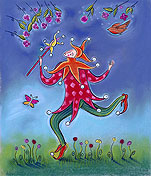

Books about Paganism
Paganism (from Latin paganus, meaning "country dweller", "rustic") is a blanket term used to refer to various polytheistic religions. The group so defined includes most of the Eastern religions, Native American religions and mythologies, as well as non-Abrahamic folk religions in general. More narrow definitions will not include any of the world religions and restrict the term to local or rural currents not organized as civil religions. Characteristic of pagan traditions is the absence of proselytism and the presence of a living mythology which explains religious practice.
Since the later 20th century, "Pagan" or "Paganism" has become widely used as a self-designation by adherents of Neopaganism. As such, various modern scholars have begun to apply the term to three separate groups of faiths: Historical Polytheism (such as Celtic polytheism and Norse paganism), Folk/ethnic/Indigenous religions (such as Chinese folk religion and African traditional religion), and Neo-paganism (such as Wicca and Germanic Neopaganism). More »
